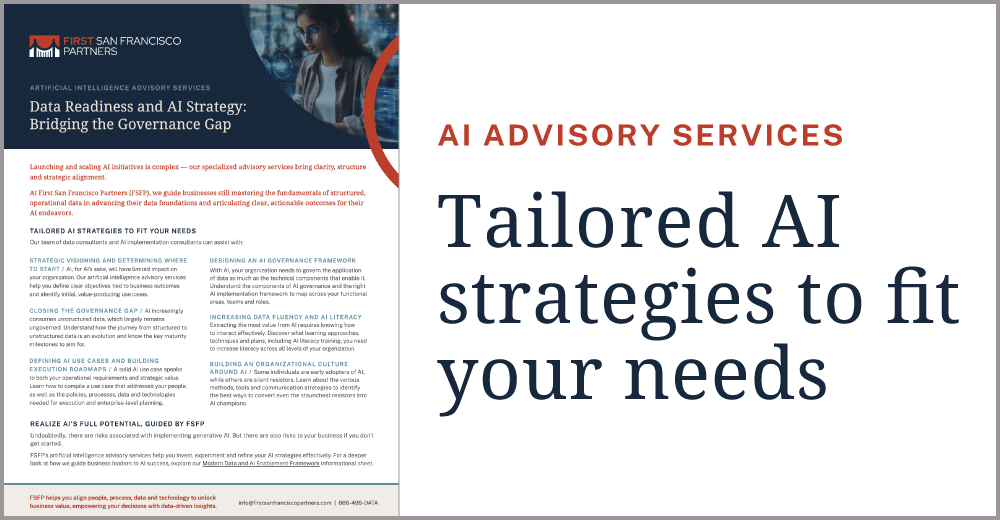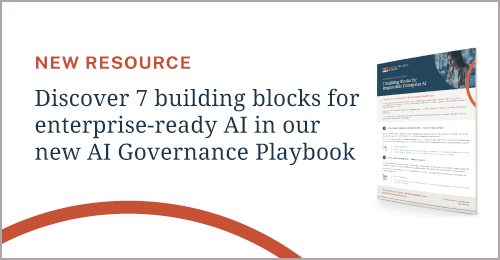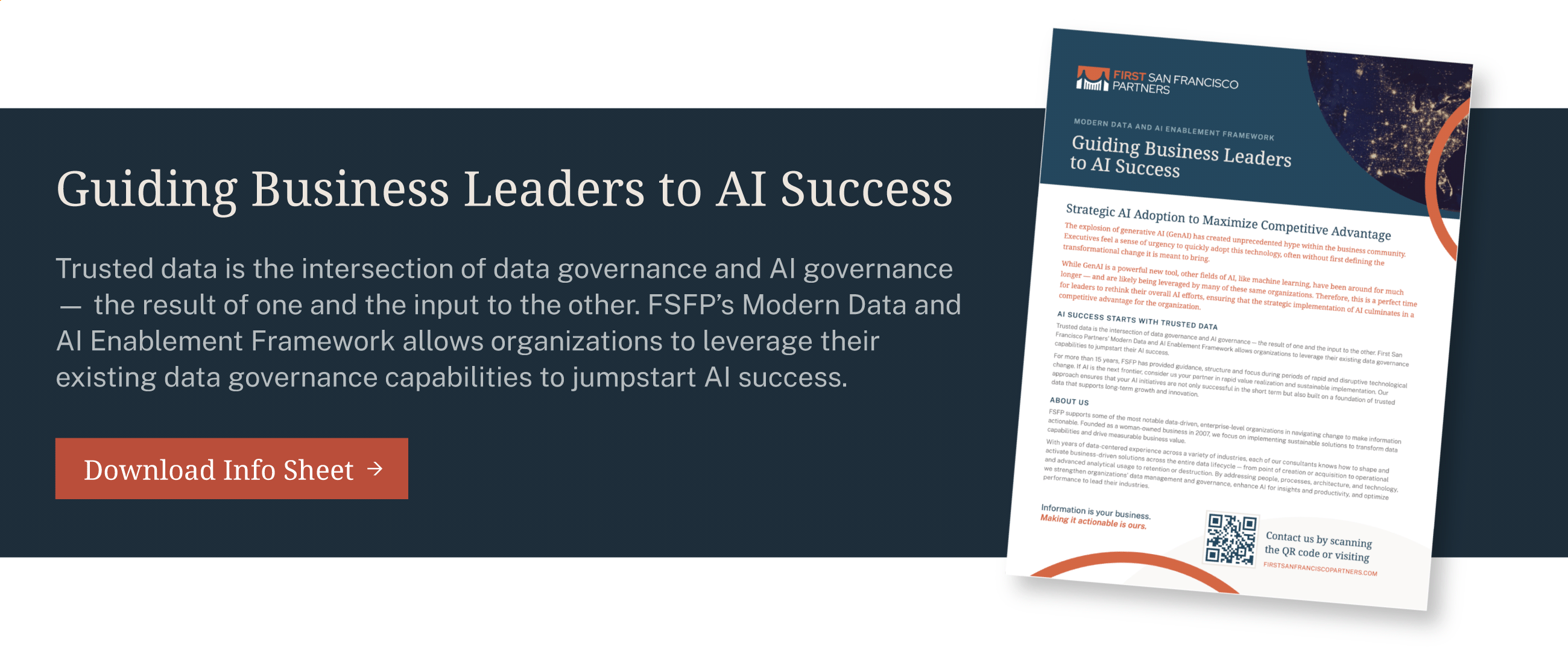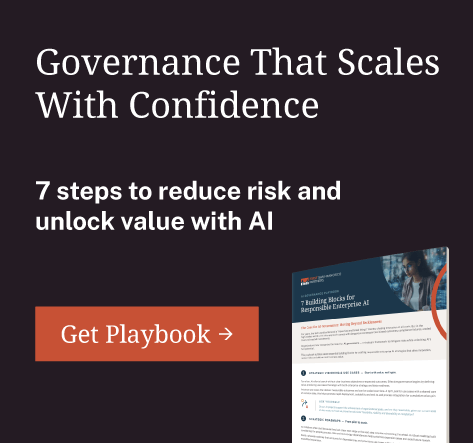We began working with a global health clinic in 2021 when the organization’s Chief Data and Analytics Officer hired First San Francisco Partners (FSFP) to bring clarity and structure to its data ecosystem. Over the next three years, what began as a strategic engagement evolved into a multi-faceted transformation, touching everything from data stewardship and ERP governance, to AI readiness and automation.
During our time with this client, the field of AI was evolving from predictive to generative. Our client’s ambitions evolved, too. What began as isolated efforts in advanced analytics and research soon expanded across the organization, driving broader transformation.
With more of our client’s teams turning to AI-powered solutions, the need for reliable, credible and accessible data has become mission-critical. To meet that challenge, we applied FSFP’s proven data enablement methodology at the onset of the engagement. It’s built to scale across people, processes and technologies, outlining a clear and sustainable path forward.
Laying the Groundwork: Setting the Stage for Enablement
Our engagement with this healthcare client began by maximizing the value and improving the user experience of its Collibra data catalog. Often, a catalog is the best window into broader data enablement opportunities, revealing where changes or additions are needed in data governance and other data management capabilities. The client’s capable and highly engaged data enablement team brought a clear vision and thoughtful ideas to the table, complementing our recommendations.
By initially focusing on stewardship engagement in the data catalog, we gained insight into the organization’s overall stewardship maturity. This included how they managed master and reference data, as well as how data quality rules were being applied across healthcare-specific and operational domains. Our deeper understanding helped surface related processes and technologies that were core to the client’s broader data strategy, including the organization’s growing interest in advancing AI.
FROM 30 INDIVIDUAL DATA STEWARDS TO 40+ TEAMS: A decentralized data movement took root across our client’s healthcare organization — from research and operations to patient care — laying the foundation for trust in AI-powered decisions.
People Enablement: Building a Stewardship Network at Scale
One of the most meaningful and measurable outcomes of this engagement was activating the client’s data stewardship network. Stewards play a large role in translating data policies into practice, ensuring that the organization’s values and governance principles are reflected in day-to-day data use.
We identified an immediate opportunity to tap into the organization’s values (respect, integrity, stewardship, etc.) as a driver of meaningful change in how data is managed and used.
With the formalization of a data governance operating model, FSFP advised our client on how to govern patient data — and to apply that model more broadly across the entire data ecosystem. Governing all data domains beyond patient data is essential for building trust in AI-powered decisions, especially when you consider the volume of reference data used in executive metrics, operational workflows and research models. When we collectively designed a stewardship model and supporting architecture to manage change across the ecosystem, our client considered this a key win that would fuel later efforts.
The governance operating framework also introduced a sponsorship and accountability structure across leadership levels and core mission areas (patient care, education and research) to ensure that our client captured and governed its major data decisions. With our involvement and support, our client expanded stewardship from a core group of fewer than 30 individuals to more than 40 dedicated teams involving hundreds of people across the healthcare clinic organization.
Process Enablement: Operationalizing Governance Across the Enterprise
With the governance operating model in place, FSFP developed onboarding materials and an execution plan for rollout. This approach enabled the client’s primary digital division (our main point of contact for this engagement) to transition into more of a support role, empowering its data creators and users to manage their own data.
Our step-by-step data framework focused on specific data asset types, helping different areas consistently document key elements, such as datasets, reports, metrics, measures and glossary terms. Together, we established consistent documentation practices across data domains, which led to clearer communication and a unified catalog that supported effective data management and governance.
We also facilitated efforts to make the case for embedding stewardship into a major enterprise resource planning (ERP) transformation, positioning governance not as a separate initiative but as a critical enabler of long-term success. Because the ERP rollout was highly visible internally, it became the perfect platform to highlight data-centric decision-making.
The ERP initiative became a springboard, extending the data governance model to other domain teams that were eager to manage key data assets more effectively. As stewardship teams became more comfortable with business metadata (data about the data), FSFP helped connect it to technical metadata and lineage, leading to greater transparency. This, in turn, paved the way to defining business and quality rules tied to specific data elements, building trust in the data powering AI models and decision-making.
AUTOMATION AS A STRATEGIC LEVER: Our client harnessed existing tools to scale trust in data and accelerate AI readiness across the enterprise.
Technology Enablement: Laying the Foundation for Scalable, AI-Ready Data
As part of this multi-year client engagement, we assessed the client’s current data architecture and data management toolset, offering recommendations to align its multi-year business and data strategy for long-term success.
As we do with many clients, our initial focus was on stabilizing governance and stewardship through the enterprise data catalog. We leveraged the catalog’s out-of-the-box capabilities to create a consistent user experience and simplify metadata management, thereby reducing the need for customization.
With applied stewardship in place, the client then worked with FSFP to ensure that its master and reference data management solutions were aligned with the new governance model and primed for future AI applications, including those tied to the digital experience.
Through a comprehensive review of our client’s data enablement architecture and supporting systems, we identified opportunities to streamline processes. Many of the improvements could be achieved by making better use of automation features already available in the existing technology stack.
FSFP brought an informed perspective on where data management, BI and data platform vendors are evolving AI and automation and where gaps still exist, especially in areas like catalogs, data quality, mastering and orchestration. We helped our global health clinic client leverage its strong vendor relationships to advocate for specific AI-friendly features, such as the automated population of definitions in the catalog. These conversations directly influenced partner roadmaps, creating mutual value.
TRUSTED DATA, REAL IMPACT: This healthcare organization didn’t just prepare for AI — they built the foundation to operationalize it across care, research and operations.
Outcomes: Enabling AI, Empowering People
Throughout our multi-year partnership, this client made significant strides in data enablement, scaling stewardship from a handful of individuals to hundreds, strengthening governance during a major ERP initiative, and laying the groundwork for trustworthy AI in patient care and operations.
Key wins for our client include:
-
- Leveraged the Collibra data catalog to drive consistent metadata practices, improving trust in data and speeding decision-making.
- Expanded data stewardship from 30 to 40+ teams, enabling faster, decentralized data ownership that frees time for innovation.
- Established an enterprise-wide governance model aligned to ERP transformation, improving operational efficiency.
- Used the ERP rollout as a catalyst to embed long-term data practices, optimizing tool ROI and supporting better patient care.
- Enhanced AI readiness through improved metadata, lineage and automation — paving the way for future capabilities to transform care delivery.
Are you interested in finding out how your organization can lay the groundwork for AI-ready data or how best to activate data stewardship? Let’s talk.
Array




